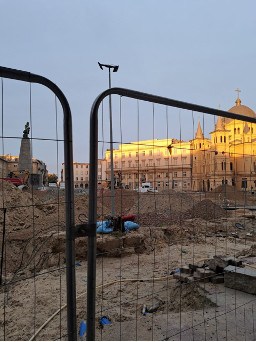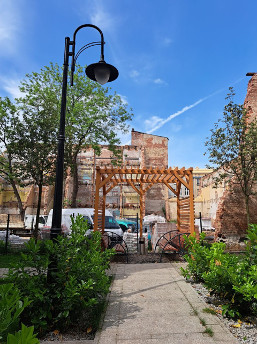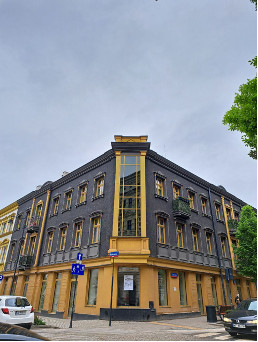
The EU’s contribution to local development: the case of Lodz
Author: Yuliia Manuilova
For ten days in May this year, I had the incredible opportunity to participate in a study visit as part of Study Tours to Poland (STP), a Polish-American Freedom Foundation programme, implemented by the Leaders of Change Foundation in cooperation with the Borussia Foundation. The aim of the study visit was to share Poland’s experience in building and operating state institutions, civil society, a free market economy, and managing European integration. This journey not only enriched my knowledge and left unforgettable memories, but also provided some interesting insights regarding the impact of the European Union on local development.
I had the privilege of exploring the spectacular city of Lodz, located in the heart of Poland. Our visit was organised by the LEVEL-UP organisation, which familiarised us with the role of the European Union in the daily life of citizens. One of the sessions we attended was “The EU as an important institution for the city of Lodz”, conducted by lawyer Oktawia Braniewicz. Thanks to this lecture, I had the opportunity to delve into the key factors of the European Union’s impact on the development of the city, its infrastructure, and the well-being of its residents. Subsequently, I witnessed at first hand the tangible results of these endeavours.
The EU plays a crucial role in facilitating the development of the city of Lodz. One of the main financial instruments of the EU’s cohesion policy is the European Regional Development Fund (ERDF). Its purpose is to contribute to reducing disparities between the levels of development of European regions and to improve living standards in the least-favoured regions. The ERDF has two primary goals:
- to strengthen the labour market and regional economies;
- to enhance cross-border, transnational and interregional cooperation within the EU.
Given Lodz’s industrial and manufacturing heritage, the renovation of formerly neglected areas, industrial sites, and historic districts is one of the key priorities for utilising these funds. Therefore, Lodz has benefited from the EU funds allocated for urban revitalisation and regeneration projects. The funds are also instrumental in financing infrastructure projects in the city, such as the construction and modernisation of transport networks, various roads, railways, and public transport systems. Overall, the revitalisation of the city’s urban sites attracts investment and improves the quality of life for residents. Even while strolling through the city, one cannot help but notice the abundance of ongoing construction and reconstruction projects taking place.



The restoration in process; a renovated building
The Lodz region is not only renowned for its natural beauty but also for its flourishing business environment that supports entrepreneurship and innovation. Various initiatives financed by EU funds have been put in place to provide financial assistance and create a conducive atmosphere for local businesses to thrive. In addition, the region has established strong ties with research institutions, fostering collaboration and knowledge exchange to drive innovation and develop new technologies. Recognising the importance of education and skills development, funds have been allocated to enhance educational opportunities in Lodz. This includes the modernisation of educational infrastructure, ensuring that students have access to state-of-the-art facilities and resources. Furthermore, the implementation of vocational training programmes equips individuals with practical skills that are in high demand in the job market.
One of the EU programmes which had a positive impact on the city was the Recovery assistance for cohesion and the territories of Europe (REACT-EU) that supported investment projects that foster crisis-repair capacities and contributed to a green, digital and resilient recovery of the economy, including support for maintaining jobs, short-time work schemes and support for the self-employed. Moreover, a notable impact has been provided to parents and children under the age of three, enabling parents to find a balance between their professional and domestic responsibilities. Through the EU project “Mom at Work, Nanny at Home,” dozens of families have benefited from subsidies specifically designed to assist with the employment of nannies. This support has not only eased the burden on parents but has also created a nurturing environment for children during their early developmental stages.
LATEST

How you can help the planet every day

Building Europe: Poland’s experience of joining the European Union and lessons for Ukraine

World Health Day 2024: My Health, My Right

EUREKA MEETS EUROPE – opportunities to develop and study. My experience

Can you wear pink in the workplace?
More campaign pages:
Interested in the latest news and opportunities?
This website is managed by the EU-funded Regional Communication Programme for the Eastern Neighbourhood ('EU NEIGHBOURS east’), which complements and supports the communication of the Delegations of the European Union in the Eastern partner countries, and works under the guidance of the European Commission’s Directorate-General for Neighbourhood Policy and Enlargement Negotiations, and the European External Action Service. EU NEIGHBOURS east is implemented by a GOPA PACE-led consortium. It is part of the larger Neighbourhood Communication Programme (2020-2024) for the EU's Eastern and Southern Neighbourhood, which also includes 'EU NEIGHBOURS south’ project that runs the EU Neighbours portal.

The information on this site is subject to a Disclaimer and Protection of personal data. © European Union,